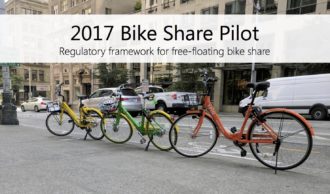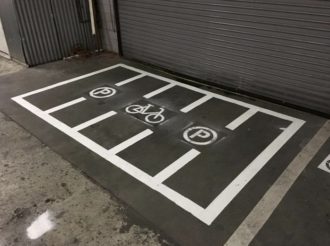Bike share pilot’s daily ridership blows past Pronto’s lifetime totals, rivals both streetcars combined

From a recent SDOT presentation to the Seattle Pedestrian Advisory Board (PDF).
As bike share companies added more bikes to Seattle streets during late summer and early autumn, the number of trips accelerated, too. Combined, Spin, ofo and LimeBike are carrying nearly as many daily riders as both the First Hill Streetcar and the South Lake Union Streetcar combined.
For the first two months, the brand new bike share services carried just under 120,000 trips. Since then, as the number of bikes ballooned, the number of trips accelerated even as typical seasonal biking trends say ridership should have been slowing down. By the end of November, the most recent figures Seattle Bike Blog has received from SDOT, the combined trip total reached 347,300. Riders even passed the million-mile mark.
To put that in perspective, Pronto Cycle Share carried 278,143 trips total during its entire two and a half years of operations. It took private bike share companies just over three months to pass Pronto's lifetime total. The number of bikes permitted was about 9,400 by the end of November, though many of those are not in service due to maintenance. Pronto had 500 bikes.
At this point, Pronto is no longer a useful measuring stick for bike share in Seattle. Averaging 2,711 rides per day, bike share companies have already blown past ridership on the First Hill Streetcar (1,600 riders per day) and the South Lake Union Streetcar (1,400 riders per day). In fact, considering the accelerating rate of ridership, it's likely that the bike share companies have had many days carrying more riders than both streetcars combined.
That bike share services are already rivaling two streetcar lines that cost about $190 million to build is pretty incredible. Free-floating bike share services have cost the City of Seattle almost nothing. In fact, these companies pay the city permit fees. And at $1/ride, bike share is the cheapest way to get around other than walking or owning your own (not-high-end) bicycle. That's far, far cheaper than other private mobility services, like car share, taxis and app taxis.
Healthy, zero-emission, popular and affordable transportation that could lower traffic congestion at nearly no cost to the city? I understand that this all sounds too good to be true. But so far, that's what's been happening with free-floating bike share in Seattle.
It's not all perfect, of course. Bikes that block walkways (whether left there by users, blown over by the wind or pushed over by drunk people) cause problems for people with vision impairments and people who use mobility devices.

Image from an SDOT presentation.
But with such amazing benefits coming from the bike share services, the city should be looking at how to help these services succeed and keep walkways clear. And some reasonable investments could go a long way to help. The good news is that SDOT will soon be trialing some designated bike parking areas specifically for free-floating bikes.
My favorite idea is for SDOT to expand its existing on-street bike corrals to include extra space for free-floating bikes. The city should also add a lot more bike corrals all over the city. On-street bike parking helps keep sidewalks clear, and even if a bike is knocked over, it likely won't fall into the walkway. Bike corrals can also be installed near street corners, which helps prevent illegal car parking that often encroaches on crosswalks and blocks sight lines. That's good for everyone.
Imagine if every intersection in a commercial or designated pedestrian zone had at least one bike corral. This would not only help keep walkways clear, it would also dramatically expand available bike parking for people's private bikes.
As the pilot permit stage is set to wrap up December 31, the city does not yet have a permanent bike share permit ready to go. Instead, companies will continue operating as they have been while SDOT develops a permanent permit over the winter. Details from SDOT:
SDOT will evaluate data from past six months to determine if free floating bike share permitting is feasible in the City of Seattle. The Transit and Mobility team will evaluate:
- Ridership Data
- Safety and Collision stats
- Vendor Compliance
- Bike Parking issues
SDOT is concerned with improperly parked and misplaced bikes, and as part of the final evaluation, is actively working on a solution to correct the issue. Residents can expect a new parking initiative in the coming days that provides designated parking spaces for bike share bikes to address parking issues for during the remainder of the permit year. We expect to launch in three neighborhoods in the coming days"
- Total bikes: 9,388
- Average Trip Duration: ~30.3 minutes
- Total Trip Duration: 7,306 days
- Average Trip Length: ~3.0 miles
- Total Trip Length: 1,052,061 miles
- Total Trips: 347,003
- Average Trips per Day: 2,711
- Weekend Trips Percent: 33%
We should be getting updated data, including trips through December, at the end of the month. So stay tuned.